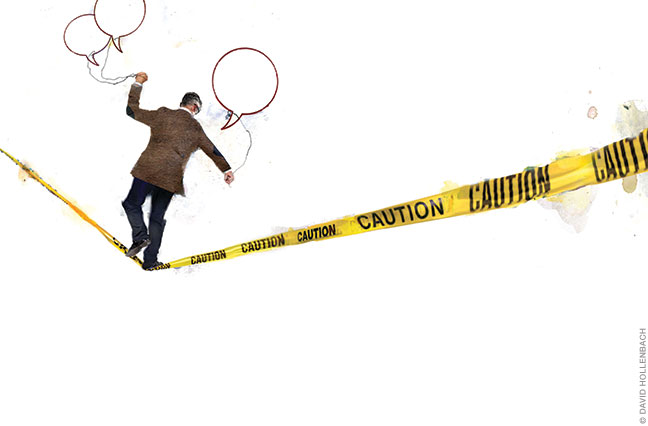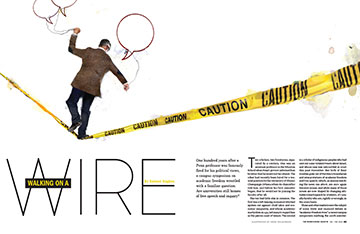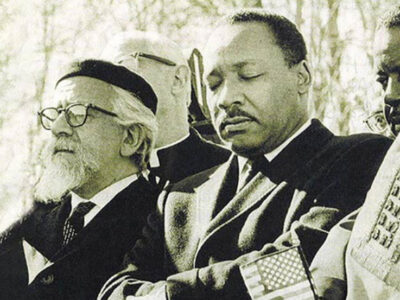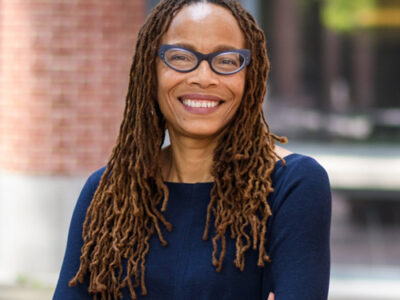
One hundred years after a Penn professor was famously fired for his political views, a campus symposium on academic freedom wrestled with a familiar question: Are universities still homes of free speech and inquiry?
BY SAMUEL HUGHES | Illustration by David Hollenbach

Two scholars, two firestorms, separated by a century. One was an assistant professor in the Wharton School when Penn’s provost informed him by letter that he would not be rehired. The other had recently been hired for a tenured position by the University of Illinois Champaign-Urbana when its chancellor told him, just before his first semester began, that he would not be joining the faculty after all.
The two had little else in common. The first was a left-leaning economist who had spoken out against child labor and economic inequality, and whose academic martyrdom in 1915 led many to regard him as the patron saint of tenure. The second is a scholar of indigenous peoples who had sent out some virulent tweets about Israel, and whose case was only settled in court this past November. But both of their troubles grew out of the blurry boundaries and interpretations of academic freedom and free speech—which, as anyone watching the news can attest, are once again live-wire issues. And while many of those issues are now shaped by changing attitudes toward speech by students, it’s usually faculty who are, rightly or wrongly, in the cross-hairs.
Those and other matters were the subject of some lively and nuanced debate in “Academic Freedom Now,” a recent campus symposium marking the 100th anniversary of the first case mentioned above, which has come to be known as the Scott Nearing Affair. (For more about Nearing C1906 Gr1909, see “An Affair to Remember,” Mar|Apr 2002. For more about the second case, see the sidebar below.)
“There is increased concern that universities are no longer protected havens for open expression,” Claire Finkelstein was saying, “and that university administrations are increasingly catering to public pressure to restrict speech.”
Finkelstein, the Algernon Biddle Professor of Law and director of the Center for Ethics and the Rule of Law at Penn, was the first panelist to speak at the symposium, which was held in late October at the Kislak Center in Van Pelt Library. Joining her were Stanley Fish C’59, professor of humanities and law at Florida International University and professor of law at Cardozo Law School; Ann Franke CW’74 G’74 L’77, former staff counsel of the American Association of University Professors (AAUP); and Bruce Kuklick C’63 G’65 Gr’68, The Nichols Professor of American History Emeritus. Peter Conn, the Vartan Gregorian Emeritus Professor of English and professor of education, served as moderator.
The panelists wrestled with—and sometimes sparred over—a range of nettlesome issues: from professors losing their jobs for voicing political beliefs to students’ increasing tendency to favor psychological safety over views they find threatening or objectionable. They warned about the ever-increasing number of adjunct professors, who have few of the protections and benefits that their tenured colleagues enjoy. They touched on the influence of outside funders, who sometimes try to shape the courses that their endowed professors teach and the materials they use.
Being academics, they also spent some time discussing relevant phrases from dusty statements issued by the AAUP. One, from 1915, was that “University teachers should be understood to be, with respect to the conclusions reached and expressed by them, no more subject to the control of the trustees than are judges subject to the control of the President who has appointed them.” The other concerned what Franke called the “important distinction” between the phrases freedom in the classroom and full freedom in research in a 1940 Statement of Principles on Academic Freedom and Tenure agreed upon by the AAUP and the Association of American Colleges.
The symposium took place before some of the recent confrontations at the University of Missouri, Yale, Princeton, Dartmouth, and other schools made national headlines. But the panelists were not lacking in fresh material.
While demands for “trigger warnings”— alerting students that potentially traumatizing material is about to be presented—and “shadow classes” (offering basically the same class as an offending professor’s but taught by a non-offending one) may be new, accusations of censorship, intimidation, and administrative meddling are not. Professorial politics and classroom comportment have been charged subjects since at least Scott Nearing’s day, though Twitter, Instagram, iPhone videos, and video study materials have added a new dimension. (As a thought experiment, imagine the Water Buffalo incident in the age of social media.)
“What happened in [Nearing’s] era is always happening,” said Kuklick at one point. “It’s just a question of which parts of the university curriculum are acting as lightning rods.”
But the tectonic plates beneath the academy have shifted, too. When the “increased focus on trauma and mental health” is combined with students’ desire to feel emotionally safe, Finkelstein pointed out, the result is often an “outcry over unpopular political positions”—and a “new source of pressure for university administrators to restrict free speech on campus.”
“The battle lines around freedom of expression on campus have changed,” she added. “Student groups now typically appear on both sides of the ledger, some resisting and others demanding that the university administration take measures to censor disturbing or controversial content.”
Though there was some robust disagreement over the need to expose students to views they find unpalatable or threatening, for Fish, it all added up to a warning: Professors should stick to teaching their subject matter.
“What we must always remember is that the threat to academic freedom and academic life always comes from constituencies who wish to turn the pedagogical space into a political space that reflects their preferences,” he said. “The groups that have attempted to do this include churches, trustees, founders, donors, governors, legislators, private advocacy groups, and students. Because that’s what’s going on in the trigger warnings. It’s just that the students have now inherited the mantle that was once worn by what a president of Harvard called ‘monstrous and barbarous trustees.’”
In a 1998 survey, noted Franke, first-year students at Grinnell College were asked to choose between two statements. The first was: “It is important for the college community to make sure all students feel comfortable.” The second was: “People have to learn how to deal with being uncomfortable.”
The results? “Eighty-four percent of the students endorsed the first proposition, that we all need to feel comfortable, as opposed to the second,” noted Franke. That emphasis on psychological safety, she added, “potentially discourages robust discourse.”
Twoyears ago, the University of California-Santa Barbara’s student government approved a resolution calling for mandatory warnings about material that could “trigger PTSD symptoms,” said Finkelstein. It had been sponsored by a victim of sexual abuse who “felt overwhelmingly uncomfortable when graphic depiction of rape was presented in one of her classes.” Oberlin College also recently published an official document advising faculty to remove provocative material that “fails to contribute to learning goals,” Finkelstein noted. “It also suggested making triggering material optional for students.”
She pushed back against that development: “Students need to hear ideas that they disagree with. They need to hear ideas that are offensive, that shock them, that are lovely, that are amusing, that are titillating, and all sorts of different things they need to hear. They may come out of your classroom angry and upset, but they may come out having thought of something in a new way.
“Now, whether you should consistently take a political position and try to present it as the position that only right-thinking people have is a completely different matter. But you can take a political position in a classroom and, at the same time, make clear that you encourage students to form their own views.”
“I couldn’t disagree more on every single thing,” Fish responded. “Announcing your views and also announcing at the same time that of course you welcome and expect other views to be articulated is a fake exercise. Students and children know what’s expected, and they’ll deliver it.”
While academic ideas “indeed can be distressing, disturbing, surprising, and intriguing, they have to be academic ideas,” he added. “We are trained in our subject matters. That’s what we should confine ourselves to. Period.”
“What do you remember from your college days?” Finkelstein asked. “Probably the courses that elicited the strongest emotional response from you. It’s not the content of what we teach them, ultimately, that matters that much. It’s teaching: bringing them to engagement with ideas. And that sometimes has to happen by provoking them, by upsetting them, by shocking them. And politics is a good way to do that.”
“Emotional responses are contingent,” said Fish. “We’ll never know when we’re teaching a class how Student A, B, C, or D is going to respond to material or to a discussion that takes place in the classroom. All you can know as a teacher is that you have presented up-to-date material to the students and equipped them with the analytic tools that will allow them to think about that material when the course is over.
“Now, other things happen, including emotional responses, maybe even something like conversions or moments of great epiphany. But they can’t be aimed at. And if you start with the aim to produce those things, then once again you cease to become an academic, and you become a therapist or a guru or something equally unpalatable.
“I’m not saying that you should not allow politically charged topics into your classrooms,” Fish added, “but that you should depoliticize them by subjecting them to academic analysis. All you have to do is ask yourself the question, when you’re making any presentation or planning a class: What am I trying to do here? Am I trying to get my students to plumb the complexities of a subject? Or am I trying to nudge them, however subtly, in some direction or another? You always know which it is. And just stay away from the latter.”
That approach carries the significant benefit of keeping outside meddlers at bay, he added: “True academic discussion stops short of the waters of politics, stops short of urging action as opposed to contemplation. As the AAUP warned in 1915, if we don’t clean up our own house, someone else will come forward to do it for us.”
During the question-and-answer session that followed, one member of the audience pointed out that it’s often “hard to talk in the classroom about ‘conclusions reached through careful and thorough scholarship’ without dwelling at some length upon the consequences of those conclusions, and in particular consequences for public policy and social policy and political policy.” And it can be even harder to “draw those consequences out without expressing personal opinions.” As a result, the notion of simply sticking to conclusions reached as the “starting point of a definition for academic freedom and its scope is overly narrow.”
“I certainly agree with you that conclusions reached doesn’t tell the entire story,” said Fish. “And I also agree that students often will object to the kinds of materials that are being presented to them, and will say that they wish that other texts were being assigned or that some texts that were assigned were not assigned, at which point we should tell them: ‘When you get to be a professor, you can make that decision. Just shut up for now.’ And I mean that, and I say that.
“You can talk about the question of consequences and introduce students to various scenarios of consequences, and you can invite the students to discuss those scenarios,” he added. “But you shouldn’t tip your hand.”
Last summer, the chairman of the US House Judiciary Committee sent letters to the presidents of 161 public colleges and universities across the country “to ask them why their policies failed to protect the First Amendment rights of students and faculty,” Finkelstein noted. Quoting from the Foundation for Individual Rights in Education (FIRE), she said that the letters were sent to colleges that “maintain at least one policy that clearly and substantially restricts or censors speech on campus.”
“While the handling of some recent cases involving open expression may have prompted these concerns,” she noted, “universities that take the side of protecting open expression [also] find themselves facing intense criticism.
“Consider the recent situation at Northwestern University involving Professor Arthur Butz, who [in 2006] had issued a statement endorsing Iranian President Ahmadinejad’s claim that the Holocaust never occurred,” she said. “The response of the university community as well as others around the country was furious, and many expressed the view that Northwestern should sanction or dismiss Professor Butz. Northwestern declined. Then Northwestern President Henry Bienen issued the following statement, explaining his refusal to take action against Butz:
‘Butz is a tenured associate professor in electrical engineering. Like all faculty members, he is entitled to express his personal views, including on his personal Web pages, as long as he does not represent such opinions as the views of the university. Butz has made clear that his opinions are his own, and at no time has he discussed those views in class or made them part of his class curriculum. Therefore we cannot take action based on the content of what Butz says regarding the Holocaust, however odious it may be, without undermining the vital principle of intellectual freedom that all academic institutions serve to protect.’”
Northwestern, Finkelstein added, “faced a veritable storm of criticism for taking this position.”
It also reportedly began providing shadow classes for students who didn’t want to take a class with Butz, noted Franke. She asked Finkelstein if that knowledge would “temper” her positive view of the Northwestern administration?
“It does somewhat, because I think that students can survive unpleasant political views on the part of their professors much more than they think they can,” said Finkelstein. “They’re exposed to all sorts of things today that would have shocked me as a student, and would have shocked many, many people across many generations. And they don’t view themselves as shrinking violets in the face of violence, sexuality, the music they listen to, the art they see. But if they’re exposed to political speech, suddenly they’re going to fall apart!”
When Fish asked how she’d feel if Butz were to talk about the Holocaust in his engineering classes, Finkelstein responded that while she generally wasn’t in favor of “restricting pedagogic method,” the subject was “irrelevant” for an engineering class, and therefore “not good pedagogy.”
“Well, let’s remember that he hasn’t done this,” said Fish. “He’s teaching electrical engineering, and actually he does more than tweet. He’s one of the leading proponents of Holocaust denial in this country. But the fact that some students may know that about him should not in any way be taken into consideration, either by the students or the administration, when it comes to setting up courses, like the shadow courses that were referred to. That’s an extremely bad idea. However, if he were to discuss the question of Holocaust denial in those classes, he should be fired right away.”
When Finkelstein stressed that being able to “engage in the free exchange of ideas, however unpleasant it may be at times, and to make our own determinations about what counts as relevant material is a critical part of defining [the academic] community and defining our function as educators,” Fish responded:
“You keep sliding into doing good. And that’s the trouble with academics. A), they want to do good; and B), they want to do good because they think that, as a class, they’re particularly virtuous and wise. And anyone who has ever been, as I was for many years, a member of an English department, knows that that’s not true.”
While it may seem easy for a university administrator to take a clear and principledstand on Holocaust denial—“which, in the academy at least, is like astrology and Intelligent Design” in terms of being discredited—Kuklicksaid that “it’s not so easy for the administrator to take those positions when there’s a genuine hot-button issue that seems to be at the center of a department’s curriculum.” But, he added: “it’s up to the administration to be absolutely firm about this. And if you don’t have an administration that knows what the guidelines are, and will maintain them and not cave in to a variety of pressures, then you’re going to have a very unhappy university.”
Not all offenses against student sensibilities reach the level of Holocaust denial. At Rowan College, sociology professor Dawn Tawwater showed a “controversial feminist parody of the music video for the Robin Thicke song ‘Blurred Lines,’” noted Finkelstein. “Offended students filed complaints. At a hearing last fall, the college administration attempted to force Tawwater to sign a last-chance agreement, requiring that she refrain from using indecent language in the classroom and apologize to offended students. When Tawwater refused to sign, Rowan fired her. Tawwater has since filed a suit claiming her rights of academic freedom and free speech have been violated, and the results of that suit are not determined yet.”
The fact that Tawwater’s forced resignation was initiated by students, rather than the administration, Finkelstein noted, was further proof that “increasingly, the threat to academic freedom lies in students pressing for restrictions on faculty speech because of perceived harm from a remark or approach on the part of the faculty member.”
Because of his sacrifice, Scott Nearing is often viewed as the patron saint of tenure. But not every professor, by a long shot, enjoys its protections.
“Three-quarters of undergraduate teaching now across the country is done by adjuncts,” said Franke. “And you can fire adjuncts a lot easier than you can tenured faculty.”
“As more and more privileges are heaped on tenure-track and tenured professors, more and more of the actual instruction is done by adjuncts,” a group that includes teaching assistants, graduate students, and lecturers, noted Kuklick. “While tenured professors get very good salaries, excellent benefits, and permanent job security, a quite large group of adjuncts have very, very low salaries, almost no benefits, and no job security at all. There is something wrong with a system that protects a small group in an extraordinary way and offers no protection to another quite large group of scholars.”
Kuklick also blasted the “failure of rules and regulations about retirement,” which have led to “lifetime jobs” for tenured faculty, who sometimes keep teaching into their late 70s. Not only are they generally “less effective at what they’re doing than people 20 years younger,” he said; they also “clog the advance of younger scholars.” His recommendation: “make those privileges less obscene and expand them to a wider group.”
“I have always felt at Penn as a tenured faculty member that my academic freedom was being absolutely respected,” said Peter Conn. “But when the university raises money, which it does now 24 hours a day, choices get made about the priority areas in which the money will get raised. Those kinds of decisions are generally made by administrators.” And while those administrators “may go through a semblance of faculty consultation,” the process is “very top-down-driven” and “does respond to trustee opinions,” he noted. And even if the integrity of the institution is not directly threatened, “it’s certainly being deeply affected by the overall economic, budgetary, fundraising, development, and allocation processes, most of which are administrative processes that shape the long-term profile of the faculty and the areas of its expertise.”
One potentially insidious influence is that of corporations and other deep-pocketed donors who provide universities with funds for specific courses—sometimes with strings attached. Fish noted that the holding company BB&T funds courses on ethics, for example, and while he had no problem with that per se, “BB&T insists that the curriculum of such courses include as one of the key texts Ayn Rand’s Atlas Shrugged—which I would now categorize for students as cruel and unusual punishment.
“Now, of course, if an instructor for whatever reason believes that his course will be improved by the addition of that book to the syllabus, then he or she should be able to do it,” he added. “But if in fact the addition of that book is a quid pro quo with a donor, then once again the academic enterprise has been abandoned, and the academic’s soul has been sold for something less than a mess of pottage.”
SIDEBAR
A Tale of Two Dismissals
“Scott Nearing and Steven Salaita were both deprived of university positions because of their political views: Scott Nearing in 1914 and 1915, Steven Salaita in 2014 and 2015,” said Stanley Fish. “The reason for [Nearing’s] non-appointment was that he held progressive views about child-labor laws and class privilege that were described by an alumnus writing into an alumni journal ‘as being wholly at variance with the views of the founder, Mr. Wharton.’” Salaita, a scholar of indigenous peoples, had also “produced utterances that turned out to be objectionable to a board of trustees.”
Although Salaita had not yet started teaching at the University of Illinois at Champaign-Urbana, Fish explained, he had accepted its offer for a tenured position in the fall of 2013, following the usual vetting procedures, recommendations, votes, and so forth. He and his wife resigned their positions at their previous institutions, and had begun searching for a house for his family and a school for their young son.
“Then, in the fall of 2014, less than three weeks before Salaita was to begin teaching, a letter arrived from Chancellor [Phyllis] Wise, who, citing a boilerplate phrase in his contract, subject to the approval of the board of trustees, told Salaita that he would not be joining the faculty after all, because she had determined that his file would not be positively received by the board of trustees.
“What had happened is that Salaita had issued a series of tweets, very critical of the state of Israel, and especially of its treatment of the Palestinians,” said Fish. (Example: “Zionists are transforming anti-Semitism from something horrible into something honorable.”) “Chancellor Wise contended that the decision to unappoint Salaita was based not out of his political views, but out of a concern that the intemperate expression of those views would carry over into his classroom performance, and thus create an uncomfortable and distressing experience for students who happened to hold contrary views. In short, we’re not firing him because we don’t like his views; we’re firing him because we love our students. No one believed her. And she has since resigned, and a lawsuit [by Salaita] now goes on.” (In November the university agreed to pay Salaita $600,000 plus his legal expenses to settle two lawsuits.)
Fish, who made it clear that he “absolutely despised” Salaita’s views, later pointed out that Chancellor Wise and the trustees had received angry letters from donors, including one that said: “I have given you many six-figure gifts over the years. You will never see another penny from me.”
“No university administrator wants to get a letter like that,” said Fish. “So part of what was going on was a fear that longtime donors—and actually generations and families of donors—would turn their face away from the university.”
But the “absolutely crucial question raised by both the Nearing and the Salaita cases,” he said, is: “For whom do professors work? The trustees of both the Wharton School and the University of Illinois answered, ‘Why, they work for us.’ But in 1915 the AAUP declared: ‘University teachers should be understood to be … no more subject to the control of the trustees than are judges subject to the control of the President who has appointed them.’
“What the trustees and the president buy is an independent judgment,” Fish noted, and a university administration buys the “ability to offer descriptions and analyses that are responsive to the search for truth, rather than to the preferred truths of a founder, or a trustee, or a donor, or a university president.”
Academic freedom is a “very limited doctrine,” he added, “a freedom conditioned by and tied to the performance of the core academic task—to follow the evidence wherever it leads. If that task is to be faithfully executed, no set of views can either be anointed in advance or dismissed out of hand before inquiry begins. Therefore, the teacher/researcher must be free. Not free, however, to do anything he or she likes, but free in his or her disinterested search for the truth in the classroom and in the production of scholarship. That’s it.”
Wise had feared that Salaita’s political views would be the “basis of his classroom teaching and have the effect of dividing his students into two groups,” said Fish. “However, the very extensive process that led to the offering of an appointment to him of course canvassed his teaching record, and that record was absolutely free of any taint of incorrect action on every measure. He was responsible, fair, and if we can use that word in quotations, ‘objective.’”
But, Fish added: “In a 2008 essay explaining his field, indigenous studies, Salaita said, ‘Indigenous studies involves a proactive analysis of, and opposition to, neoliberalism, imperialism, neocolonialism, and other socially and economically unjust policies.’ If that is the content and impelling ideology of Salaita’s classroom teaching, he has crossed the line. He is no longer acting as an academic, committed to dispassionate analysis, rather than to advocacy. And therefore he no longer merits the shield of academic freedom. He’s not doing academics. He’s doing social justice. Now, social justice is a perfectly good thing to do, but it is not a perfectly good academic thing to do.”
There is a direct parallel to the Nearing case, suggested Fish, who cited reports that Nearing had not only “used his classroom to critique and attack the privileged,” but had also “singled out one member of the privileged class, a stepson of a trustee, for criticism.” If true, he added, then Nearing “crossed the line from academic to advocate, and he, too, I believe, loses the shield of academic freedom.”





I am puzzled about the quality of higher education whenever I learn of a graduate of a prestigious institution who has contributed to the economic trauma of our nation and the world. Institutions of higher learning, based on facts, research, logic, and objective data, should take a position in debates where at least one of the parties holds extremist views that do not stand up to scrutiny. Every course should include relevant ethical and moral issues with an emphasis on trust, honesty, discernment, integrity, etc.
First, I don’t agree with Dr. Fish’s position that there is and should be a strong division between scholarship and advocacy. If you study labor markets, you’re going to be in a privileged position to understand just how bad child labor is and what is needed to stop it. I don’t know how you could stop yourself from sharing that insight with students. Good understanding of a topic will lead to some political conclusions.
Second, give students more credit. They’re young adults, but they’re adults. They can be exposed to ideas without being indoctrinated. I took a seminar class at Penn on classical liberalism (libertarianism). Our final paper required us to criticize Atlas Shrugged based on the views of other libertarian authors we had read for the course. Yes, we had to read Ayn Rand, but we also had to understand and then dismantle her arguments.
Third, it’s disturbing that a corporation like BB&T could influence a curriculum so directly. I hope their arrangement is at least transparent to the students.